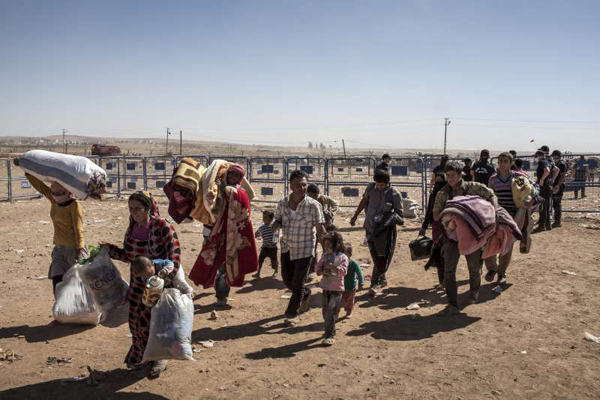
Hundreds of thousands of Syrian Kurds live in fear of Islamist extremist violence – UN
The situation of the mainly Kurdish residents of north-western Syria worsened dramatically over the past week with a new ISIL onslaught which saw the extremist Islamic group reportedly capture 105 villages and threaten Kobani (also known as Ayn al-Arab), the main town in the region.
The UN Office of the High Commissioner for Human Rights (OHCHR) has received very alarming reports of deliberate killing of civilians, including women and children, the abduction of hundreds of Kurds by ISIL, and widespread looting and destruction of infrastructure and private property, spokesperson Rupert Colville told a news briefing in Geneva.
On Saturday, Secretary-General Ban Ki-moon demanded an immediate end to the violence.
As of 2006, the population of Kobani was some 150,000 and that of the region around half a million. A further hundred villages have reportedly been abandoned by fearful inhabitants and the population movement could be much larger than so far, he added.
The UN Refugee Agency (UNHCR) reported that majority of new arrivals are women, children and the elderly who arrived exhausted, having walked several kilometres to safety on a dusty, rough road with their luggage. Some elderly and disabled were carried to safety by relatives, their wheel chairs hopelessly unsuited to the rough terrain.
UNHCR spokesperson Melissa Fleming said her agency was helping Turkey cope with the influx, donating large trucks to be used as mobile registration centres, complete with computers, biometric and photographic equipment.
The agency has already provided tens of thousands of relief items - blankets, sleeping mats, jerry cans and plastic sheets – to help in the response coordinated by the Government of Turkey.
More aid was on the way, with the first in a series of airlifts bringing aid for up to 200,000 people due to arrive in Adana airport, Turkey, on Wednesday from Amman, Jordan. Another three flights from Amman and Copenhagen are expected to follow later in the week.
Residents of Kobani have lived in difficult humanitarian conditions since the town and surrounding villages first came under siege by ISIL forces in 2013, with shortages of food, fuel and potable water.
Fleming noted that the number of refugees flooding into Turkey over the past few days was comparable to the total that the whole of Europe has taken during the entire three years of conflict.
OHCHR is also closely following the trial of Syrian human rights defender Mazen Darwish who, along with two colleagues, has been charged with “promoting terrorist acts” as prescribed under article 8 of Syria’s broad and ill-defined anti-terrorism law.
Darwish, Hani Al-Zitani and Hussein Ghareer worked with the Syrian Center for Media and Freedom of Expression and had been detained in February 2012 in Damascus by Syrian Air Force Intelligence officials during a raid on their office.
The men have reportedly been ill-treated and tortured in detention, but those allegations have not been investigated, Colville said. OHCHR is calling on the Syrian Government to release all those detained for peacefully exercising their rights to freedom of expression, assembly and association, including human rights defenders, journalists and political opponents who had been detained under the anti-terrorism law, he added.
Syrian Kurdish refugees cross the border into Turkey after fleeing fighting around the city of Kobani in north-east Syria. Photo: UNHCR/I. Prickett
Support Our Journalism
We cannot do without you.. your contribution supports unbiased journalism
IBNS is not driven by any ism- not wokeism, not racism, not skewed secularism, not hyper right-wing or left liberal ideals, nor by any hardline religious beliefs or hyper nationalism. We want to serve you good old objective news, as they are. We do not judge or preach. We let people decide for themselves. We only try to present factual and well-sourced news.







